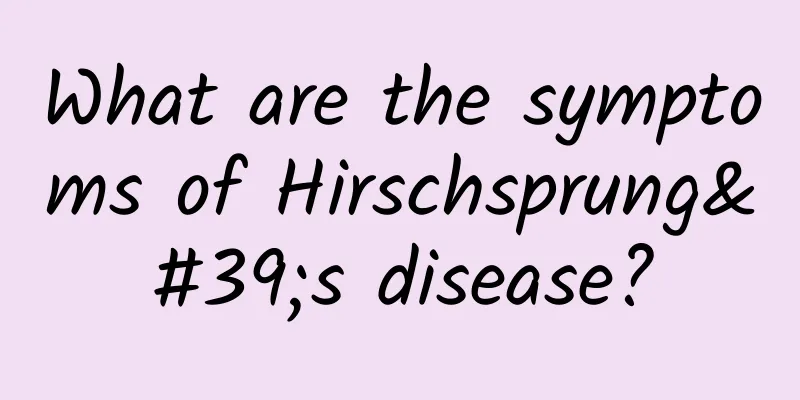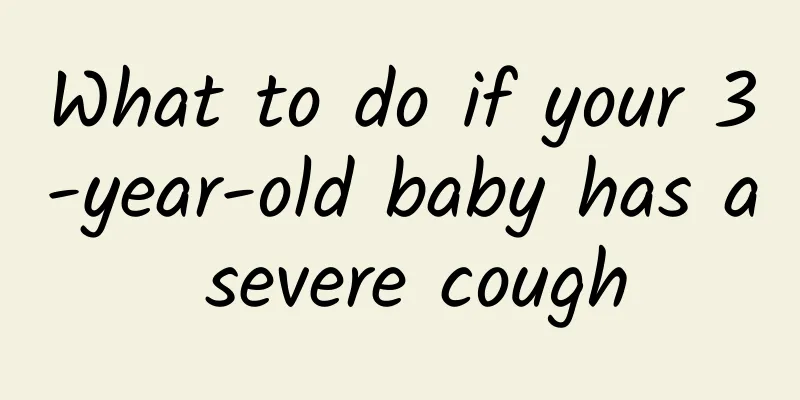What are the symptoms of Hirschsprung's disease?

|
Hirschsprung's disease is a congenital intestinal disease caused by the loss of intestinal ganglion cells. The main symptoms are constipation, abdominal distension and vomiting. Treatment includes surgical resection of the diseased intestinal segment and postoperative care. Hirschsprung's disease is caused by the failure of intestinal ganglion cells to migrate normally to the distal colon during embryonic development, resulting in the inability of this section of the intestine to move normally, and feces accumulate in the intestine, causing constipation and abdominal distension. Symptoms can appear in the neonatal period, manifested as delayed meconium excretion, abdominal distension, vomiting, etc. As the disease progresses, the child may suffer from malnutrition, growth retardation and other problems. 1. The main symptoms of Hirschsprung's disease include constipation, abdominal distension and vomiting. Constipation is the most common symptom. The child may not defecate for days or even weeks, and feces accumulate in the intestines, causing abdominal distension. When the abdominal distension is severe, the abdomen is obviously bulging, and hard lumps can be felt by palpation. Vomiting often occurs after eating. Due to intestinal obstruction, food cannot pass smoothly and refluxes into the stomach, causing vomiting. Symptoms are more obvious in the neonatal period, with delayed excretion of meconium for more than 24 hours, bulging abdomen, and vomitus that may contain bile. 2. The diagnosis of Hirschsprung's disease mainly relies on clinical manifestations and imaging examinations. The doctor will make a preliminary judgment based on the child's symptoms and signs, and further confirm the diagnosis through imaging examinations such as abdominal X-rays and barium enema. Barium enema can show stenosis of the diseased intestinal segment and dilatation of the proximal intestinal tube. Rectal biopsy is the gold standard for diagnosis, and the loss of ganglion cells in the intestinal wall is observed under a microscope. 3. The treatment of congenital megacolon is mainly surgical, including transanal pull-out and laparoscopic-assisted surgery. Transanal pull-out involves pulling out the diseased intestinal segment through the anus and removing it, and then anastomosing the normal intestinal tract to the anus. Laparoscopic-assisted surgery involves making a hole in the abdomen through a laparoscope, removing the diseased intestinal segment, and anastomosing it. After surgery, the child's bowel movements need to be closely observed and reviewed regularly to ensure that intestinal function has returned to normal. 4. Postoperative care is crucial to the recovery of the child. In the early postoperative period, the child needs to fast and supplement nutrition through intravenous infusion. After the intestinal function is restored, the child should gradually transition to a normal diet. Parents need to help the child with anal dilation training to prevent anastomotic stenosis. Regular follow-up should be conducted to monitor the child's growth and development, and possible complications should be discovered and dealt with in a timely manner. Hirschsprung's disease is a congenital intestinal disease that requires early diagnosis and treatment. Through surgical removal of the diseased intestinal segment and postoperative care, most children can recover normal bowel function and grow up healthily. Parents should pay close attention to the bowel movements of their children and seek medical treatment in time if any abnormality is found to ensure that the children receive timely and effective treatment. |
<<: Is massage useful for children with diarrhea?
Recommend
Mild neonatal hypoxic-ischemic encephalopathy
If you suspect your newborn has mild symptoms of ...
What viruses cause hand, foot and mouth disease?
What are the viruses that cause hand, foot and mo...
Chinese patent medicine for treating ADHD in children
When children show symptoms of ADHD, parents must...
What to do with neonatal jaundice? Analysis of the magical effect of probiotics on jaundice
Most newborns will have jaundice of varying degre...
What causes jaundice in the elderly and how to treat it
Jaundice in the elderly may be caused by genetics...
What medicine should children take for respiratory tract infection, cough and phlegm
When children have respiratory infections and cou...
Is congenital corneal dystrophy hereditary?
Congenital corneal dystrophy is an eye disease th...
What medicine should babies take for cold and runny nose? Babies with cold can take these Chinese and Western medicines
When the weather drops suddenly and the climate c...
What to do if your child keeps coughing
The causes of children's cough include wind-c...
What are the common treatments for breast milk diarrhea in children?
What are the common treatments for breast milk di...
Does hernia in children have any impact on adulthood?
Hernias are more common in children. If they are ...
How to tell if your child has jaundice? Check out these 3 symptoms to see if your child has jaundice
Many friends don't want to see their children...
How about children's cough syrup? What are the effects of children's cough syrup?
For every family, taking care of children is an i...
What are the symptoms of polio?
Many parents don't know much about diseases l...
Can Children's Cold Relief Granules Treat Runny Nose?
Xiaoer Ganmaoshu Granules can be used to relieve ...









